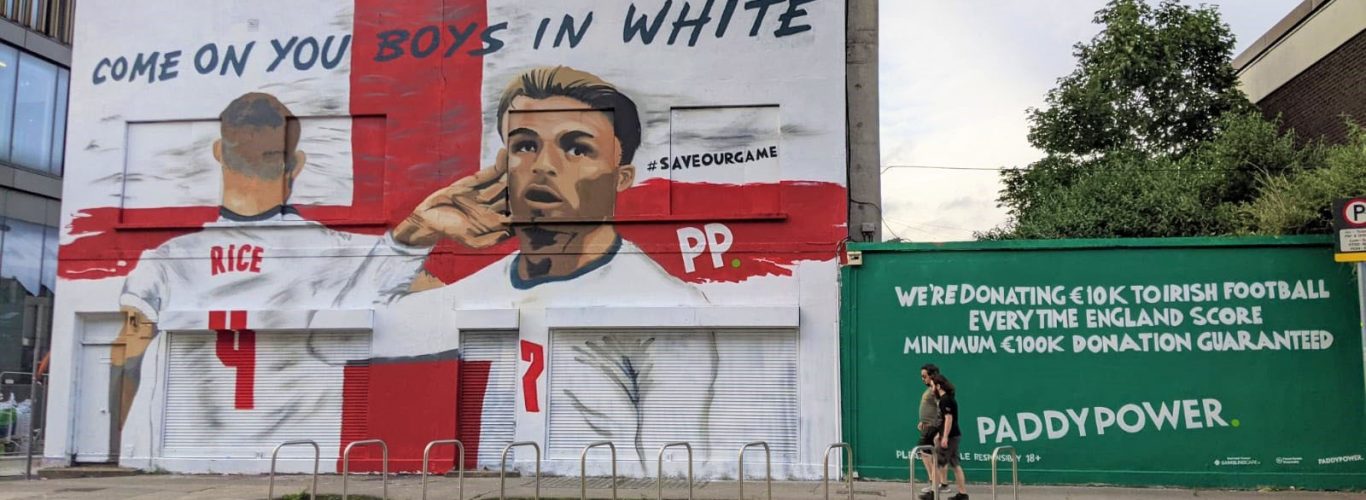Friendly rivalries aside, there was much for the Irish to admire about England’s recent performance in the European Championship. Gareth Southgate’s understatement and modesty for a start. And although it was not a move that was to everyone’s tastes, the players’ decision to “take the knee” was at least a well-intentioned gesture in solidarity with the Black Lives Matters campaign.
And, of course, there was the fact that nearly half the side were eligible to play for Ireland.
Indeed, there is a mixture of wry bemusement and, perhaps, a little irritation that Harrys Kane and Maguire, Jack Grealish, Kalvin Philips and Declan Rice were not wearing green jerseys. (Indeed, Rice controversially switched from playing for Ireland under-21s, while Grealish played for a GAA team in his youth).
What a shame they didn’t turn out for the auld country, right?
To a point. What the players encapsulate is much more interesting than football and lies at the very heart of the Good Friday Agreement, namely the ‘east-west’ connection between Ireland and Britain.
The Agreement famously rests on three inter-related sets of relationships. The first is the internal relations governing Northern Ireland, between Protestant-Unionists and Catholic-Nationalists. The second focuses on both jurisdictions on the island of Ireland – the ‘north-south’ dimension. The third, concerns relations across the Irish Sea between Ireland and Britain – ‘east-west.’
This is usually shorthand for reassuring unionists that Britain will guarantee their rights – and indeed it is – but it is also something else; a guarantee of the Irishness of millions more British people with Irish heritage.
The England football team reminds us of the scale of the Irish community in Britain. So numerous, in fact, that more people here (excluding Northern Ireland) have an Irish-born grandparent than on the entire island of Ireland (including Northern Ireland).
By this I do not just mean those who quaff a pint or two of “the black stuff” on March 17 each year, but those for whom their Irish connections matter. People who follow events across the Irish Sea avidly. It is a constituency that will come into its own once the heavy lifting of uniting Ireland is out of the way, as we try to embed the changed arrangements.
The Irish in Britain will keep Ireland close, which will, in turn, help unionists to nurture their connection to Britain. I predict that once relations between Britain and Ireland have normalised, post-reunification, then they will only ever deepen. Irish unity will not be quite as grand as its adherent believe, nor anywhere near as dreadful as its detractors insist. What it will offer is a chance to embed a full and final settlement in the beleaguered history of these islands. It is easy for United Irelanders to get caught up with the importance of the north-south link, but the east-west dimension is just as important.
Kevin Meagher is author of ‘What A Bloody Awful Country: Northern Ireland’s Century of Division,’ published by Biteback

Friendly rivalries aside, there was much for the Irish to admire about England’s recent performance in the European Championship. Gareth Southgate’s understatement and modesty for a start. And although it was not a move that was to everyone’s tastes, the players’ decision to “take the knee” was at least a well-intentioned gesture in solidarity with the Black Lives Matters campaign.
And, of course, there was the fact that nearly half the side were eligible to play for Ireland.
Indeed, there is a mixture of wry bemusement and, perhaps, a little irritation that Harrys Kane and Maguire, Jack Grealish, Kalvin Philips and Declan Rice were not wearing green jerseys. (Indeed, Rice controversially switched from playing for Ireland under-21s, while Grealish played for a GAA team in his youth).
What a shame they didn’t turn out for the auld country, right?
To a point. What the players encapsulate is much more interesting than football and lies at the very heart of the Good Friday Agreement, namely the ‘east-west’ connection between Ireland and Britain.
The Agreement famously rests on three inter-related sets of relationships. The first is the internal relations governing Northern Ireland, between Protestant-Unionists and Catholic-Nationalists. The second focuses on both jurisdictions on the island of Ireland – the ‘north-south’ dimension. The third, concerns relations across the Irish Sea between Ireland and Britain – ‘east-west.’
This is usually shorthand for reassuring unionists that Britain will guarantee their rights – and indeed it is – but it is also something else; a guarantee of the Irishness of millions more British people with Irish heritage.
The England football team reminds us of the scale of the Irish community in Britain. So numerous, in fact, that more people here (excluding Northern Ireland) have an Irish-born grandparent than on the entire island of Ireland (including Northern Ireland).
By this I do not just mean those who quaff a pint or two of “the black stuff” on March 17 each year, but those for whom their Irish connections matter. People who follow events across the Irish Sea avidly. It is a constituency that will come into its own once the heavy lifting of uniting Ireland is out of the way, as we try to embed the changed arrangements.
The Irish in Britain will keep Ireland close, which will, in turn, help unionists to nurture their connection to Britain. I predict that once relations between Britain and Ireland have normalised, post-reunification, then they will only ever deepen. Irish unity will not be quite as grand as its adherent believe, nor anywhere near as dreadful as its detractors insist. What it will offer is a chance to embed a full and final settlement in the beleaguered history of these islands. It is easy for United Irelanders to get caught up with the importance of the north-south link, but the east-west dimension is just as important.
Kevin Meagher is author of ‘What A Bloody Awful Country: Northern Ireland’s Century of Division,’ published by Biteback